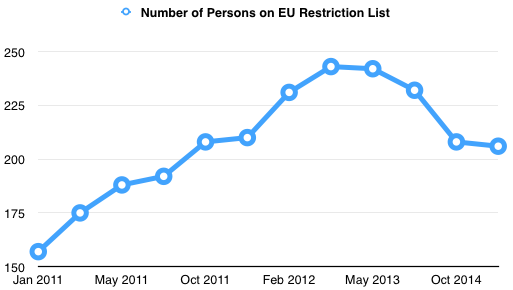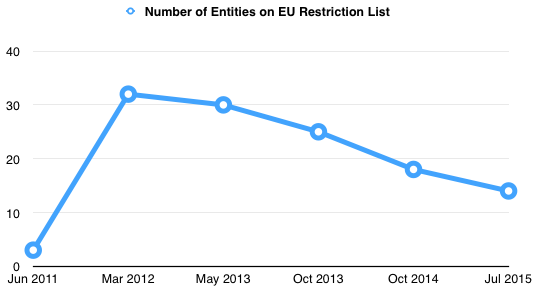Belarus-EU Thaw: Will It Last This Time?

On 13 July, the Council of the European Union once again removed restrictions against several Belarusian officials and entities subjected to an EU-wide travel ban and asset freeze.
That decision amended Belarus sanctions listings introduced after the failure of Belarus authorities to meet OSCE commitments to democratic elections in 2006 and 2010.
EU foreign ministers have already eased sanctions against Belarusian regime more than a few times. The current change in the EU policy toward Belarus resembles the rapprochement between Minsk and Brussels ahead of the 2010 presidential election.
While the sanctions against the regime of Aleksander Lukashenka have failed to influence his policies, lifting them will not bring about positive change either. History has shown that the West’s mixing of pragmatic and normative approaches in dealing with the authoritarian regime has neither fostered closer cooperation with Belarus nor protected the democratic opposition from persecution.
A Deeper Look at the Current Thaw
The war in Ukraine has dramatically changed the geopolitical situation in Eastern Europe. Minsk was thrust into the international spotlight when it hosted the cease-fire negotiations. Preoccupied with stability and predictability of domestic politics in the countries neighbouring the EU, Western politicians saw this as an opportunity for cooperation with the Belarusian president. 
The EU’s decision to extend its sanctions for another year until 31 October 2015 shortly after the Minsk Protocol on 5 September 2014 demonstrates its concern about the problematic human rights situation in Belarus. The reality of that ruling, however, is more complicated.
Together with the decision to extend the sanctions, the EU’s foreign ministers also removed 24 persons and seven entities from the restrictions list. More than 200 persons and 14 entities have remained under sanctions, but among those removed are those regarded by many as key financial sponsors of the Lukashenka regime and Belarusian oligarchs – Uladzimir Peftijeu and Anatoly Ternavskiy. From the seven de-listed entities, in turn, three belong to Yury Chiz, another financial supporter of the Belarusian president, even though the owner’s name remains in the restrictions list.
Since the post-election crackdown in 2010, the EU has de-listed more than 15 per cent of Lukashenka’s supporters and more than half of all sanctioned entities, not having received any concessions from the Belarusian government.
Besides the lifting of restrictions against several persons and entities, the EU has removed sanctions against a state-owned Belarusian energy company Belarusneft, suspended the travel ban against Belarusian Foreign Minister Uladzimir Makiej, extended the invitation to the summit in Riga to Belarus and expanded visa services at the Embassy of the United States in Minsk. These clear signs of the EU’s warming toward Belarus were motivated not by the improvement of the domestic situation in Belarus but by the outbreak of war in Ukraine.
Befriending Belarus: Did It Work Last Time?
The EU’s current rapprochement with Belarus resembles the EU-Belarus thaw of 2008-2010, when the war between Georgia and Russia in 2008 made Russia’s neighbours, including Belarus, worry about the future of their own independence. The conflict fuelled the already ongoing disagreement between Russia and Belarus over energy prices. With the relationship between the EU and Russia strained and Lukashenka seeking better ties with the West, European foreign ministers decided to relax the restrictions on the Belarusian government in the hope of luring the country away from Moscow’s sphere of influence.
The West was happy to reward President Lukashenka’s behaviour and initiated a thaw in the relationship with Belarus after the Belarusian government released political prisoners, granted legal status to the political movement of the former presidential candidate Alexander Milinkevich, and lifted the restrictions on two opposition newspapers.
As a reward, the Belarusian president received invitation to a summit in Prague. At talks in Luxembourg in 2008, EU foreign ministers suspended a travel ban on Lukashenka and several his associates, introduced after the falsification of the 2006 election. In 2009, the EU’s Foreign Policy Chief Javier Solana paid a visit to Lukashenka to discuss bilateral relations and regional issues.
That thaw did not end well, however. Up to 700 opposition activists, including seven presidential candidates, were arrested in the post-election crackdown.
Shouldn’t We Learn From Our Past Mistakes?
Tough sanctions have always pushed Belarus to the east instead of changing Lukashenka’s ruling style. In 2011, in an interview with BELTA, Lukashenka compared sanctions to flea bites, annoying but relatively minor and benefiting neither the West nor Belarus. In a situation when sanctions have not been an effective instrument of pressure on the president and the regime in Belarus, many Western policymakers seem to forget the lessons of the past and start daydreaming about the benefits of engagement with the incumbent regime.
Belarusian authorities cannot make a geopolitical turn to Europe. Russia remains Belarus’ most important trading partner and absorbs almost half of Belarus’ international trade. Economic dependency of Belarus from Russia and interest of its president in preserving his political power will not allow for meaningful cooperation with the West.
In fact, Moscow already declared its support for reelection of the incumbent president in the October presidential election. On 17 July, Russia approved $760 million tranche to Belarus, in accordance with the previously agreed loan programme. The loan will contribute to the strengthening of Belarusian ruble before the election.
While Belarus appears more attractive than the engaged in turmoil Ukraine, trusting the words rather than the deeds of the Belarusian authorities and closing eyes to the human rights agenda ahead of the presidential election in Belarus would be a mistake.





